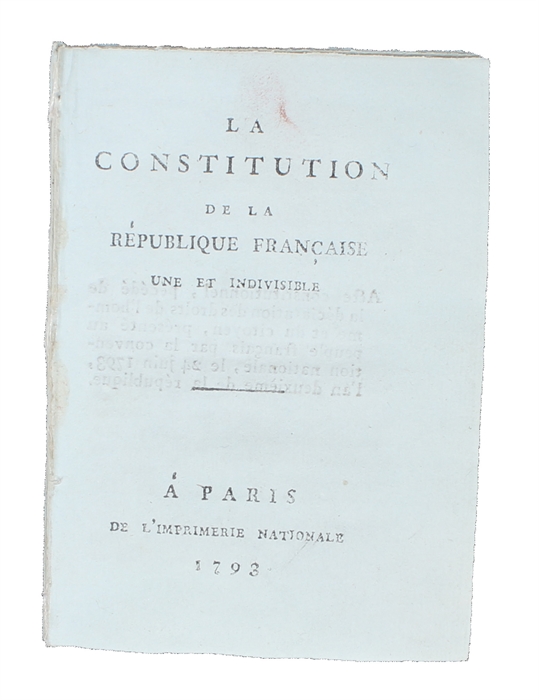DECLARATION OF THE RIGHTS OF MAN AND CITIZEN
DÉCLARATION DES DROITS DE L'HOMME ET DU CITOYEN.
La Constitution de la République Francaise, une et indivisible.
Paris, l'imprimerie Nationale, 1793. 12mo. Uncut and unbound with original stitching. Printed on blue paper. A fine, clean, and fresh copy. 39 pp.
The rare first pocket-edition of the highly influential French 1793-Declaration 'Déclaration des droits de l'homme et du citoyen' often referred to as the Constitution of the Year I, or the The Montagnard Constitution. A folio-edition was printed the same year but this pocket-edition was probably the first meant for the public. The present publication constitutes the univocal break with l'Ancien Régime.
The Constitution of 1793 was the second constitution written and approved during the French Revolution but legally created the First French Republic, which had been established on September 22, 1792. The Declaration and Constitution were ratified by popular vote in July 1793, following approval by 1,784,377 out of approximately 1,800,000 voters.
Unknown to most, the Constitution of 1791 did not entail a complete break with l'Ancien Régime. In fact, the political order envisaged by the Assembly was a form of constitutional monarchy. This uneasy compromise was bound to be overtaken by the historical events and eventually this first true republican constitution was adopted by the National Convention on June 24, 1793.
The Constitution was based on the 'Declaration of the Rights of Man and of the Citizen' of 1789, to which it added several rights, proclaiming the superiority of popular sovereignty over national sovereignty, and various economic and social rights, such as the right of association, right to work and public assistance, and the right to public education.
This constitution also required the government to ensure a "right to subsistence," while simultaneously reiterating the inviolability of personal property. To many, especially the Jacobins, the Constitution of 1793 provided a model framework for an egalitarian, democratic republic.
The text was mainly written by Hérault de Séchelles, a French judge and politician who took part in the French Revolution on the side of the Montagnards a political group during the French Revolution whose members sat on the highest benches in the Assembly. The term, which was first used during a session of the Legislative Assembly, came into general use in 1793. Led by Maximilien Robespierre, the Montagnards unleashed the Reign of Terror in 1794.
The constitution was officially suspended on October 10 in favor of "revolutionary government [...] until the peace" and it was eventually replaced by the French Constitution of 1795.
Order-nr.: 52181

